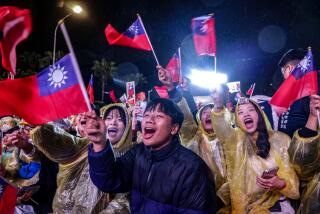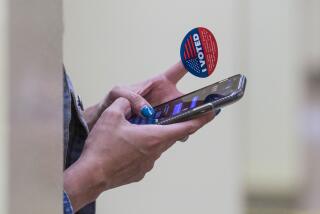East Timor’s First Free Election Nears
- Share via
VERMASSE, East Timor — For 24 years, Nobel Peace Prize winner Jose Ramos-Horta campaigned around the world for an end to violence in this troubled territory. On Sunday, he brought his message to 300 villagers preparing to vote in East Timor’s first free election.
“If the people of East Timor are fighting each other, then this freedom is nothing,” warned Ramos-Horta, who is foreign minister in the territory’s transitional government. “If you fight each other, it will start the future of this country in darkness.”
East Timor, which has been administered by the United Nations since Indonesian militias devastated the territory two years ago, is moving steadily toward full independence next year.
On Thursday, voters will elect a constituent assembly that will be charged with writing the country’s constitution and, most likely, will become its parliament.
There have been reports of voter intimidation by ardent members of some political parties, prompting concern that the election could be marred by conflict. Although no one expects serious violence to erupt, East Timorese leaders want to ensure that the territory casts itself in the best possible light.
“In this, the first free election, the message we can send to the world is we understand how much we need a democratic environment to discuss our problems and to work together,” said independence leader Jose Alexandre Gusmao.
The charismatic Gusmao, popularly known by his nom de guerre, Xanana, is widely expected to become the former Portuguese colony’s first president. Ending months of speculation, he announced Saturday that he will run when a presidential election is held next year.
Initially, the prospect of any election in which political parties vied with one another was greeted with apprehension by the East Timorese.
In a March poll by the independent Asia Foundation, the top two concerns of voters were riots (32%) and violence among party activists (25%).
Voters’ fears can easily be traced--East Timor has had bad experiences with political expression during the last quarter of a century.
Indonesia seized the eastern half of Timor island in 1975 as Portugal prepared to pull out and East Timorese political parties began fighting among themselves. Civil war broke out, paving the way for Indonesia to annex the territory--a move never recognized by the U.N.
Two years ago, Indonesia granted permission for a U.N.-sponsored vote on whether East Timor should be allowed to form its own country. Indonesia had ruled the province with brutality and greed, and a resounding 80% of the population voted for independence.
When the vote was announced, militia gangs organized by the Indonesian military ran amok, killing 1,000 people and destroying 80% of the buildings in the province.
About 250,000 of East Timor’s 800,000 people fled, although many have since returned.
Order was restored only after the U.N. sent in troops and took over administration of the territory. About 9,000 peacekeeping troops remain, many of them guarding the border with Indonesia, which controls the western half of the island.
“I think there is still a lot of tension because people can’t help but associate this election with events of the past,” said Carlos Valenzuela, the U.N.’s chief electoral officer. “If we have a peaceful election, that is the most important outcome.”
In its March survey, the Asia Foundation also found that voters were unclear about what is at stake in Thursday’s election. For example, only 5% knew that voters will select a constituent assembly. More than 60% erroneously thought they would be voting for president. However, 94% of those eligible to vote said they planned to do so.
The findings prompted the U.N. Transition Administration in East Timor to begin a program of civic education to prepare people for the election.
East Timorese fieldworkers were trained and dispatched into the countryside to help teach the fundamentals of democracy, such as tolerance, good citizenship and the virtues of a multi-party system.
“They have a very strong sense of the concepts of freedom, independence, human rights and democracy but no practical experience,” said Colin Stewart, who heads the U.N. Civic Education unit. “People are very enthusiastic, very receptive to this information.”
Sixteen parties are competing for seats in the assembly, but the Fretilin party, which led the resistance movement during Indonesian rule, is expected to win a clear majority. Some even predict it will take 80% of the vote.
Officials are concerned that winners and losers could overreact to the results, which are due by Sept. 10. To minimize the possibility of clashes, the tallies will be announced separately in each of East Timor’s 13 districts.
“There is going to be euphoria and frustration,” said Valenzuela, who helped run the 1999 election and was later evacuated from the island. “Celebration should not be made a means of aggression, and frustration should not turn to violence.”
After the results are in, the constituent assembly will have 90 days to draft a constitution. The presidential election will then be called for early next year.
Sergio Vieira de Mello, who as the head of the U.N. administration in the territory is, in effect, East Timor’s ruler, said independence will probably be formally declared between March and May.
If Thursday’s election is peaceful, De Mello anticipates, the U.N. will begin the gradual withdrawal of troops and administrators before the end of 2001.
In the village of Vermasse on Sunday, Ramos-Horta was welcomed as a hero as he began a three-day barnstorming trip across the country to urge voters to conduct a peaceful election.
Ramos-Horta won the Nobel Peace Prize in 1996 along with Carlos Filipe Ximenes Belo, the Roman Catholic bishop of Dili, the capital, for their work to free East Timor from Indonesian rule.
Ramos-Horta urged the villagers to vote against any party that tries to intimidate them and to not be afraid, noting that U.N. peacekeepers will be on alert. A free, fair and nonviolent election, he emphasized, is important for the country’s economic future.
“Investors can only come if there is peace,” he said in Tetum, the region’s historic language. “If they don’t come, there will be no jobs.”
The meeting took place in a simple hall with a concrete floor and corrugated metal roof--a building that was damaged by pro-Indonesian militias in 1999. Most of the villagers fled into the mountains after the independence vote then and lived there for two months until it was safe to return. The militias burned hundreds of houses in Vermasse.
This time, villagers said, they expect the voting to be peaceful, in part because they formed their own anti-violence youth group last week.
“People are still worried because they were traumatized by what happened in the past,” said Inacia Freitas, 20. “If there is no democracy, the country will be a mess. There will be no tolerance or solidarity.”
More to Read
Sign up for Essential California
The most important California stories and recommendations in your inbox every morning.
You may occasionally receive promotional content from the Los Angeles Times.










